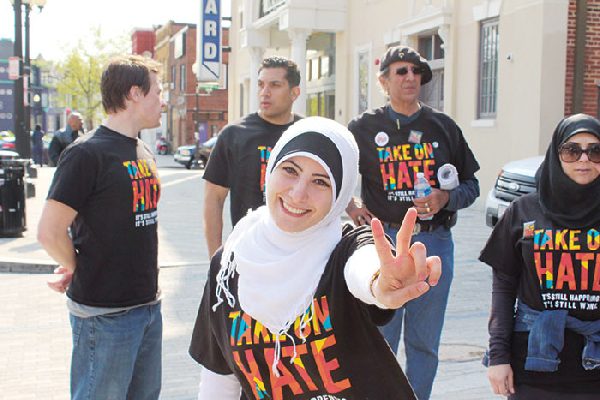
A young activist at a Take on Hate rally in Washington D.C.
DEARBORN — Those who monitor bigotry can barely keep up with Islamophobia fueled by politicians and media pundits. Ever since election season kicked off, hate crimes against Muslims have been on the rise in America, forcing Muslim Americans and advocacy organizations to defend themselves and their faith on a daily basis.
However, many Muslims are becoming critical of constantly disproving accusations, choosing to ignore them and focus on joining others in humanitarian causes.
For two years, the Take on Hate campaign has been pushing back against bigotry by correcting the false light placed on Arab and Muslim Americans.
From Feb. 8 through Valentine’s Day, the group is launching a social media campaign, “Take on Hate with Love”, to showcase the contributions of Arab and Muslim Americans.
Asha Noor, 25, is enthused about the initiative.
As the engagement specialist for Take on Hate, she is eager to highlight the community’s positive impact on society.
Noor, a Virginia native, moved to Metro Detroit about a month ago. She finished her graduate work in Latin America while working in activism with Afro-Indigenous communities, refugees, religious minorities and trauma victims.
This is where Noor became attracted to studying prejudice beneath the surface and fighting against structural racism.
“We wanna highlight the individuals who have risen above that hate by choosing love and solidarity and acceptance,” Noor said.
The week-long campaign seeks to feature individuals and organizations who have responded to backlash against Muslims with service work, Noor said.
She added that one of her favorite responses is the efforts by Muslims to raise money to rebuild African American churches burned down following the Charleston shooting last year. It showed that communities of different colors and ideologies can work in solidarity, she said.
Shifting the narrative
“We’re trying to shift the narrative and show that we have much more in common than we have in differences,” Noor said.
The negative political rhetoric is directly related to physical violence toward minorities, Noor warned.

|
| Asha Noor |
Since the Paris attacks, there have been 70 hate crimes committed against Muslim, Arab and Sikh Americans, according to Noor. She said Republican politicians are feeding into the already dangerous climate and their comments are pulling on “deeply rooted racism and Islamophobia” in the country.
Noor said she personally does not condemn any acts of violence carried out by so-called Muslims, because she does not feel terrorists represent Islam in the first place.
“I have nothing to do with DAESH; I have nothing to do with Boko Haram; I have nothing to do with al-Shabab or these terrorist groups that use violence in the name of Islam,” Noor said, using an Arabic acronym for ISIS.
Instead, Noor advises Muslims and their allies to demonstrate the positive work Muslims accomplish.
Local community organizations gathered 60 volunteers who will distribute water bottles to households in Flint this weekend and make phone calls to engage Arab American families about their needs.
However, Noor said transformation does not occur overnight and reducing rhetoric and slurs will not necessarily reduce bigotry held by many Americans.
Addressing policies that negatively affect immigrant groups is a key step in reversing damaging impacts on these communities, according to Noor.
She acknowledges doing so would be a slow process, but the campaign is not looking for a “Band-Aid fix.”
“We’re just trying to show that there’s another side to this narrative,” Noor said. “The side that’s rarely covered, which is where people rise above these difficult circumstances and choose love and solidarity and to work with other communities to really make a change. That’s why we decided to push for this campaign, to highlight love. That’s how we take on hate.”
Working abroad gave Noor a unique perspective in understanding the underlying causes of structural racism and Islamophobia in the United States. She said these conflicts are not mutually exclusive and its solutions are nonlinear.
Traveling also gave her an outsider’s perspective on Dearborn, which she said can be “hyper-segregated.”
She urged community members to overlook the minor differences between themselves and find unity in the things that make them similar.
“I felt very welcomed by the community and I think a lot of issues is just miscommunication more than anything,” Noor said. “There’s a lot of opportunity for people to rise above that and realize we have so much in common and just to choose love.”
One of the stories the campaign has highlighted is the continuation of service work friends of family of the three Chapel Hill victims embarked on, despite the tragedy.
Readers can share and find stories by using #TakeOnHateWithLove and following the campaign on Facebook and Twitter.






Leave a Reply